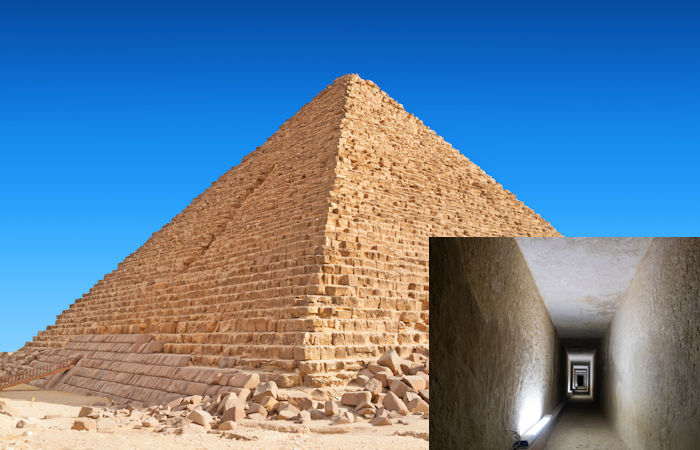Jan Bartek - AncientPages.com - Using modern scanning technology, scientists have located a long, mysterious, never-before-seen tunnel in the Khufu Pyramid in Egypt.
Named after its builder, a Fourth Dynasty pharaoh who reigned from 2509 to 2483 B.C. they Pyramid Of Khufu is one of three pyramids that make up the Great Pyramids at Giza complex.
Khufu Pyramid. Credit: Adobe Stock - Cobalt
Scientists have long suspected a void inside the pyramid, and it seems these theories have now been confirmed. Egyptian archaeologist Zahi Hawass and the country’s Minister for Tourism Ahmed Eissa, announced a 4,500-year-old sealed-off chamber had been found inside the Khufu Pyramid.
"The corridor — on the northern side of the Pyramid of Khufu — was discovered using modern scanning technology. It measures 9 meters (nearly 30 feet) in length and is 2 meters (over 6 feet) wide, perched above the main entrance of the pyramid," the AP reports.
"The discovery was part of ‘Scan Pyramids,’ a multinational archaeological mission using infra-red thermography and muons tomography to produce three-dimensional imagery of the insides of the Great Pyramids of Giza. This new scanning method is designed to provide researchers with a safe, non-invasive method of studying historic monuments," Cairo Scene reports.
In 2016 several measurements by Japanese and French researchers provided evidence for the existence of the chamber. The TUM research group has been on board since 2019, helping to explore the pyramid for hidden structures. They use various non-destructive testing methods which make it possible to look into the stone blocks and the areas behind them.
"The pyramids are a World Heritage Site. This means we have to be especially careful when conducting our investigations so that we don't damage anything. We're working on the Cheops pyramid with radar and ultrasound measuring devices that can be used on a non-destructive basis, and in part even contact-free," says Prof. Christian Grosse, TUM Chair of Non-Destructive Testing, in a press release.
Chamber is larger than expected
The initial measuring devices provided a good first impression of the situation. The scientists then used endoscopy to confirm the assumption. The team found an opening between the stones of the chevron, a solid stone construction, through which they were able to run a tube into the chamber. They then used this tube as a guide for an endoscopic camera lens. The camera confirmed the existence of the hollow space.
"Discovering a hollow space in a pyramid is already something special. But the fact that this chamber is large enough to accommodate several people, well, that makes the discovery even more important," says Prof. Grosse.
The chamber is larger than researchers had assumed in the past. The original measured data pointed to the existence of a corridor at least five meters long; however, according to initial estimates, the length of the chamber considerably exceeds this length. There are no footprints or other evidence of human activity to be seen within the chamber. Thus the research group assumes that this room has not been seen by anyone for approximately the last 4,500 years.
Determining the former purpose of the newly discovered chamber and what is located behind the back wall of the room will require additional research. The confirmed findings highlight the need for further investigation of Egyptian pyramids and in particular the value of the new approach using a combination of various testing technologies and procedures.
During the press conference on Thursday, the Ministry of Tourism and Antiquities stated that the corridor was likely designed to help relieve the weight of the vast structure, which was built as royal burial chambers around 2560 B.C.
Egypt’s Supreme Council of Antiquities has not yet released tunnel images. Credit: Adobe Stock - diy13
The corridor was “protecting or reducing the pressure on something beneath it,” said Mostafa Waziri, the secretary general of Egypt’s Supreme Council of Antiquities. He added that it might be or something else, but they would figure it out “very soon.”
“This discovery, in my opinion, is the most important discovery of the 21st century,” Zahi Hawass, Egypt’s former antiquities minister, told NBC News Thursday.
“The discovery today tells us there is something important to be discovered soon under that tunnel, which could be the real burial chamber of Khufu,” Hawass said.
Written by Jan Bartek - AncientPages.com Staff Writer







